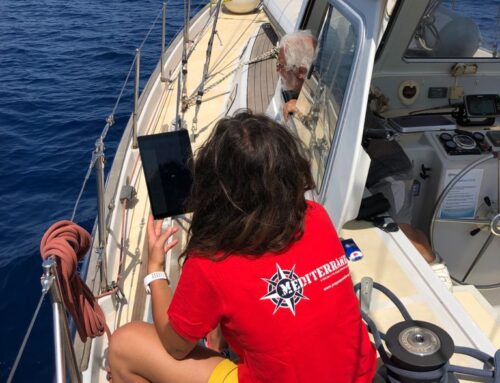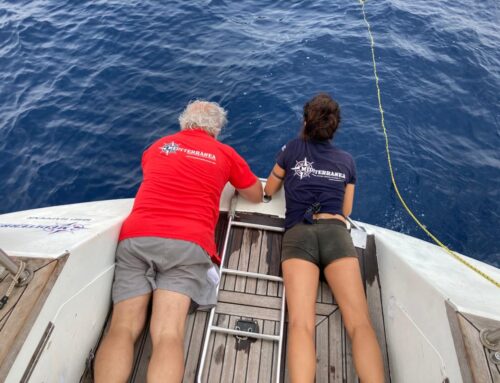(by Simone Perotti)
If you don’t know anything about a well-informed foreign correspondent who is passionate about his work, and who has for decades been on the Mediterranean scene interviewing an array of leaders, and keeps a watchful eye on the more or less glaring changes in society in the area, simply ask for Antonio Ferrari, who has something of Kapuściński and something of Terzani, with a touch of aplomb typical of Corriere della Sera.
We met him for our interview, but the moment we sat down he threw a volley of questions at us, who, what, where, how, when, the ABC of a correspondent. But we aren’t here for me. We are here to interview him, we want to share the point of view of a columnist, the mind of an observer.
“Your expedition may appear to be naive, but it’s not. You will stitching together so many forces, and all these many elements can help us to understand ourselves. And, in an age when everything is virtual, actually moving about is important. Those who do not go, will not see, and thus do not know”. I accept his approval like a blessing. On the other hand, the man standing before me, who is longer a boy, truly does know a great deal about the Mediterranean, he is somewhat of a living memory.
“I live here, in Athens, and I married a Greek lady, who teaches glottology at the University. We, and this population are fused together. So much so, that certain things jump to mind. For example: the coup here took place in 1967 and in 1969 the strategy of tensions started in Italy. Is that simply a coincidence?”
I ask Ferrari for an account of the past decades. He talks about the civil war (it was terrible) and mentions an all-Greek paradox: we, who were the invaders at the times of Mussolini, after September 8th are liked and protected by the invaded Greeks. “Strange that, is it not?! A gesture of compassion and friendship that we have perhaps never acknowledged”.
But do these Greek brothers of ours feel about the Mediterranean? “An idea, a feeling of Mediterranean citizenship, is indeed catching on, I am certain of that. It is a subliminal desire, for which there is perhaps a reason: the desire for a new horizon, something new and less battered to refer to and cling. Otherwise, all that is left is nationalism and fascism”.
Ferrari tells us about the disappointment of the Barcelona conference, in 1992, when it seemed that it would be possible to come together, try to work as a system, in an almost unsurveyable multiplicity, between the coasts of the Great Inner Sea. “Nothing was ever started. Everything simply stopped in the face of our differences. And yet the circumstances appeared to exist, and that something could happen, based on the concept of living together and solidarity, the two cornerstones of Mediterranean sentiment”. Instead we are here today observing the gestures of violent people and racists. Aided by the recession of course. “Greeks are ashamed of Golden Dawn, of that I can assure you, but I don’t think that things will go beyond the levels of tension reached several years ago. There will be no civil war here. Can you imagine what would have happened to us, to Italy, had they imposed the austerity measures that they imposed here. Blood would have stained our squares, well beyond what happened here”.
But how are things now? “There has been a very slight growth. A sliver of a positive sign, but something is moving. The recession has been felt above all in Athens, not on the islands, where it has almost not been felt at all. Tourism is doing well, above all because other countries in difficulty have given Greece an opportunity. Think of Egypt and Turkey, which were once reliable and low-cost while now they are more expensive and unsafe”.
We also discuss politics, of the Pasok crisis through to Syriza. “The movement of Tsipras is an interesting one, even if he does not say here what he is saying in Europe, his parliamentary component is too varied and divided into currents. People wonder if he will manage to keep things together, and so do I”.
We move on to talk about the youth springs, those that inflamed the Mediterranean, from Lisbon to Genoa, in Syntagma square, Taharir square, Taksim square, in Tunis. “People are moving, and finally trying to find something. Tunisia was the first to start and goods things are happening there. Libya is frightening, because it is one of the strongholds of the plot that goes from Syria to Egypt and Iraq. Jordan, which is a country I love and have been following for years, has 1.5 million Syrian refugees, and thus fears ISIS infiltration”. This army which sprang up from nowhere is very suspicious, so violent, don’t you agree Antonio? “Yes, very suspicious. We knew almost everything about Bin Laden. But what do we know about this Baghdadi, who is he, where does he come from, how was he trained, what is his role? Who knows…!”
But what truly separates us in this turbulent area? “Not religious differences. Religion is always a tool, but the real end goal of the contrasts. The enemies of the union of the countries of the Mediterranean are economic and social enemies, as they are the enemies of human rights. The common element is however security. When all is said and done, this is one of the least violent areas in the world, at least until now. Did you know that Portugal, Spain and Greece are the lowest-risk areas in the world? Imagine, three countries in recession …”.
We then start looking at our agenda. Ferrari speaks to the Italian ambassador in Turkey, then with writers and journalists. He helps us organise the Mediterranean cultural project for the Turkish leg. When we say goodbye I know we owe him a great deal, and that we will see each other again.






Leave A Comment